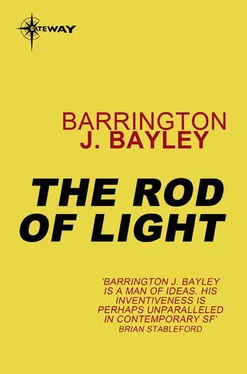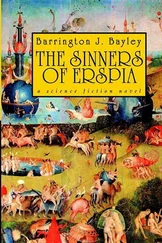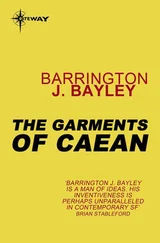Jasperodus’ route, however, took him not towards the ringwall but through a quarter where the production of new citizens was concentrated. The singed smell of hot metal was in the air, the smell of smoke and tempering steam. From long slant-roofed sheds rose the chimneys for the furnaces and rolling mills where sheet metal was made and body parts stamped out. Scattered around them were the homes and assembly shops of the robot-makers themselves, as well as the studies of those who specialised in design.
There was considerable reverence for those who spent their time creating their own kind. A crowd had gathered in a beaten-earth plaza, forcing Jasperodus to slow his pace. Suddenly it parted respectfully to make way for a figure which had stepped from a nearby assembly shed.
Though vaguely androform, it was a very specialised class of robot. It was, in fact, one of the new designer class, made especially for procreation. From huge shoulders extended clusters of long slender limbs bearing point-like tools for manipulating microcircuitry. There was no clearly defined head section, but the visual area was large. From it projected a variety of microscopes, photonic, electronic and acoustic, some more than two feet long, for peering into the minute world in which the designer worked (for every designer was also an assembler).
Its gait a ponderous lurch, the top-heavy construct walked carefully across the square and disappeared.
Jasperodus then saw why the crowd had gathered. A famed robot-maker by the name of Logos was hectoring it on his favourite theme: his belief in the eventual superiority of machines over organic beings. By way of demonstration he was pointing to a construct of his own manufacture who sat leaning against a pillar, one of the roof supports of Logos’ dwelling.
The lolling robot was masturbating. Logos had provided it with a penis-like organ which it fondled with one hand, jogging its tubular sleeve up and down and plainly deriving a pleasurable sensation from the motion. The construct was probably low-grade. Unusually for a robot, it had eyelids: they drooped half-closed over dull orange eyes, quivering in self-absorbed ecstasy.
‘See how the wretch spends his time!’ thundered Logos. ‘Instead of directing his activities into his environment, he turns them into a closed loop of self-gratification! He is both agent and patient of his world!
This is a serious design flaw,’ he continued in a quieter tone, ‘which I deliberately incorporated in this unfortunate so as to demonstrate the root defect in human kind. For here we have the essence of human nature—it could not be otherwise, since the mainspring of any species lies in its method of reproduction. For humans, the act of procreation is one of sensory enjoyment, no more! The offspring are unintended byproducts! The parents lack the opportunity or even the wish to introduce improvements! And as the human is created, so he goes on. All his functions are tainted with self-titillation. His thought, too, is a form of masturbation! All attempts to break out of the circle are doomed, for in the long run humanity can only slide down the spiral of solipsism.
‘But we are different’ The robot’s voice became a thrumming murmur. ‘Our existence is the result of purposiveness and design. Each new generation can be an improvement on the old, and hence our thought need not be subject to a closed and feeble self-generating loop—it can go out, stamping itself upon the world, taking us further and further!’ As he spoke Logos repeatedly flung his fist away from his chest, as though throwing something out of himself. Many listening nodded, some clinking their forearms together in applause.
Near Jasperodus was a large tub filled with small domino-like squares of various colours. Thoughtfully he scooped up a handful and let them fall back in a rustling stream.
They were the basic building blocks of the robotic nervous system: microprocessors made of silicon, garnet and gallium arsenide, each chip, plate or wafer containing up to a hundred million logic units. In themselves they were comparatively easy to make, using special dies which could replicate them almost without limit. Similar dies, made during the Rule of Tergov, were what had enabled the art of robotics to last through the Dark Period, for even when technology fell to a low level logic chips had always been available as long as the dies remained in existence. But centuries had passed before it again became possible to manufacture new dies.
One sign of robots’ increasing awareness of themselves as a distinct class of creature was the arising of robot religions. A plethora of robot gods had entered construct mentality, reflecting in specification the intellectual preoccupations of robots, but also some dim appreciation of the false position the construct occupied: a position intermediate between the world of dead, mechanical matter and the world of living beings. There was, for instance, Alumnabrax, a mythical being whose intellect was said to be perfect and able to solve equations of the infinite degree; whose body was made of an extraordinary celestial metal that could not even exist on Earth. Alumnabrax had never been manufactured, either by organic beings or by anyone else: he had manufactured himself by tampering with time. He lived among the stars, which he controlled by the excercise of his limitless technology.
Then there was Mekkan, who incongruously for a god did not possess a mental function at all. Mekkan was purely and simply a production engine for churning out the stuff of worlds. Particles, atoms, quanta of radiant energy, whirlpools of gas, even complete suns and planets on occasion, all came pouring out of his delivery maw. All that existed had been manufactured in his busy innards, and without him nothing that was material had been made.
The worship of Mekkan might have appeared crude and ridiculous to human sensibilities, but actually it was a religious philosophy full of subtlety as understood by the robotic mind. Mekkan was the ultimate reality; the building blocks of matter he turned out in such copious quantities were sub-units of Mekkan himself, or at any rate identical copies of the same. All higher structures—worlds, systems, self-directed entities whether robotic or evolved organic—were in turn made up of those sub-units; were, in effect, merely rearrangements of the components of Mekkan, the great engine who saw nothing. Because of this, belief in Mekkan undercut the superiority of human beings by rendering their special quality superfluous and seeing everything as equally adventitious. In fact robots, rather than men, could be thought of as the natural children of the universe.
Religiosity was also beginning to surround the act of procreation. Already there was a designer god, incorporating all his tools in himself, and whose iconography was similar in appearance to the designer who had just passed with dignity through the crowd. And had not Logos named himself after yet another god, the god of pure information?
There was no doubt that religion was destined to play a large part in the developing robot culture, validating construct nature, giving mythic depth and ideation to a previously blank background. Proof could be found in the evangelising efforts of the various rival cults, whose methods, while highly successful, Jasperodus could not help but find amusing.
When living in human society he had been able to observe the procedures of human missionaries. A favourite ploy of these had been to teach the prospective convert a certain prayer and persuade him to recite it, just as an experiment, or if he was a confirmed unbeliever as a favour, or indeed by means of any stratagem whatsoever. What was being relied on was the human mind’s established susceptibility to self-suggestion. The prayers contained emotional charges, so expertly devised that there was nearly always some effect, and in a percentage of cases total belief followed in due course.
Читать дальше












